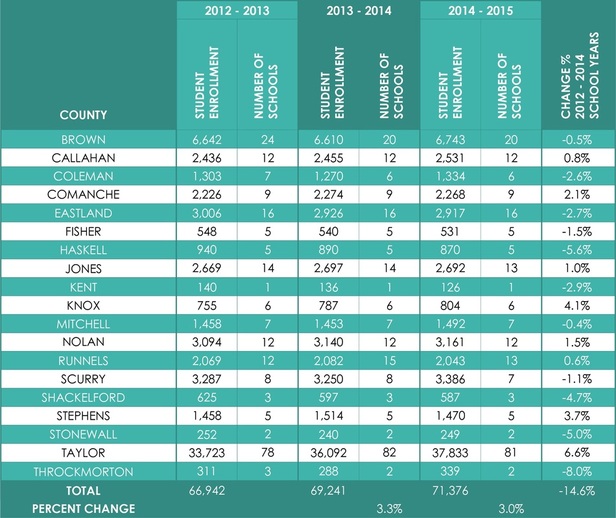One of the most significant challenges for any region is educating and developing its workforce. To achieve full economic potential educators, economic developers, and workforce development professionals must work together to align resources and execute strategies that fully leverages the potential of the community and achieves economic prosperity for its residents. To achieve these goals, an analysis of the region's workforce and infrastructure is necessary.
Educational Attainment OverviewAccording to estimates, the educational attainment level of the West Central Texas region trails that of the Texas and the nation. Analysis of the maximum level of attainment for individuals age 25 or more in 2015 revealed:
Additionally, similar to most communities, a large percentage of residents attended some college that did not result in a degree. In the region, 23% of residents fall into that category. (Source: Economic Modeling Specialists, Inc. (EMSI)). Strategies targeting up-skilling of this educational cohort can significantly improve the capacity and potential of the region's workforce, and it's attractiveness as an economic development asset. |
Your browser does not support viewing this document. Click here to download the document.
|
Education Infrastructure
Education in Texas is ranked in a public accountability system as required by the Texas Legislature. Multiple testing efforts are psychometrically utilized to derive ratings for individual schools within a district and for the district as a whole. The Texas Education Agency is responsible for the ranking designation. There are 64 Independent School Districts and Consolidated Independent School Districts in the West Central Texas region.
The number of students enrolled in the School Districts within the counties is listed in the Table below. Several Districts have experienced an increased enrollment, although minimal in some cases. Eleven of the districts have increases in overall enrollment but the attrition appears minimal as well. The number of schools in the county remains relatively stable with minor changes in the number of available schools to young residents.
The West Central Texas Region is fortunate to benefit from the 21st Century Learning Centers, administered in after school settings within various school districts. The innovative program, administered by the West Central Texas Council of Governments, currently serves seven elementary schools, four middle schools and three high schools. The program has amassed extraordinarily high performance measures with the students and is in need of replication throughout the region. It is vital to future workforce needs to place 21st Century Programming into schools with Academically Unacceptable and Academically Acceptable ratings so student learning increases and schools move up to recognized and exemplary status.
The West Central Texas region is exceedingly fortunate to be served by multiple colleges and universities, a unique feature for rural communities. Currently, Howard Payne University, Texas State Technical College, Ranger Junior College, Angelo State University, Abilene Christian University, McMurry University, Hardin-Simmons University, Texas Tech University, Cisco College, and Western Texas College all have one or more campuses within the region.
The number of students enrolled in the School Districts within the counties is listed in the Table below. Several Districts have experienced an increased enrollment, although minimal in some cases. Eleven of the districts have increases in overall enrollment but the attrition appears minimal as well. The number of schools in the county remains relatively stable with minor changes in the number of available schools to young residents.
The West Central Texas Region is fortunate to benefit from the 21st Century Learning Centers, administered in after school settings within various school districts. The innovative program, administered by the West Central Texas Council of Governments, currently serves seven elementary schools, four middle schools and three high schools. The program has amassed extraordinarily high performance measures with the students and is in need of replication throughout the region. It is vital to future workforce needs to place 21st Century Programming into schools with Academically Unacceptable and Academically Acceptable ratings so student learning increases and schools move up to recognized and exemplary status.
The West Central Texas region is exceedingly fortunate to be served by multiple colleges and universities, a unique feature for rural communities. Currently, Howard Payne University, Texas State Technical College, Ranger Junior College, Angelo State University, Abilene Christian University, McMurry University, Hardin-Simmons University, Texas Tech University, Cisco College, and Western Texas College all have one or more campuses within the region.
